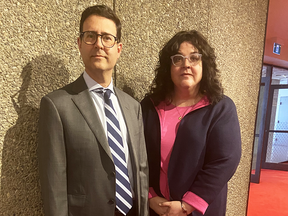What's Happened at Canadian Universities Where Canadian Jews are Threatened?
"I have students who are coming into my classes already with a very deep belief in antisemitic lies.""It's worse where there is very strong activism against what's happening in the Middle East. And it's most painful where you have a lot of Jewish students.""[Attempts were made to restrain Jewish students from access to kosher food on campus. A] safe space [needed to be made available in the boardroom for Jewish students in early October] because students didn't feel safe on campus, and faculty didn't either.""[Posters of Israeli hostages were torn down at a] terrifying rate.""[Jewish students were being followed and filmed on camera.] In classrooms, professors were just riffing on what was happening and often presenting Oct7 as legitimate resistance. ... To hear the rapes and brutality being celebrated as legitimate resistance was just terrifying and deeply wounding [for students with family and friends in Israel].""This is a national problem -- it's happening at University of British Columbia, Concordia and across Canadian universities. Where we don't have reports of antisemitism on campus, we have to ask the question, are the Jews feeling safe to report? Is there a history of reporting not being counted or dismissed?""And that activism against the state of Israel is being weaponized against the Jews on campus [students, but also staff and faculty]. The criticism of the state is slipping into 'all Zionists' or 'all Jews'.""It's really hard to walk through a campus when you see posters or people calling for intifada. And that's the reality."Deidre Butler, director, Max and Tessie Zelikovitz Centre for Jewish Studies, Carleton University; co-chair, Network of Engaged Canadian Academics
 |
The issue of antisemitism looming large on the campuses of Canadian Universities, targeting Jewish-Canadian students did not just suddenly manifest after October 7 when Hamas terrorists flooded across the border from Gaza into southern Israel -- on a planned, orchestrated, and committed one-day campaign to rape, murder, torture, torment, and take Israeli civilians hostages whether they were infants, teens, families, the elderly, foreign farm workers -- in a day of unheralded mayhem and slaughter. On a somewhat lesser plateau the threats that erupted did so for decades, intensifying in nature and number after October 7.
Before that fateful day, antisemitic attacks against Jews on university campuses spiked any time conflict between Israel and the many and varied Palestinian terror groups ignited new episodes of hate speech and threats manifesting in Canada where Jewish students have been the target of violent messages. The students have been mercilessly harassed, cornered in public spaces, spat upon. A number of prominent Canadian universities and several student unions are now facing class-action lawsuits launched by students with the claim those half-dozen universities permitted a hostile environment against Jews to flourish on their campuses.
Which has also led to the creation of the non-partisan Network of Engaged Canadian Academics, inspired by a network of similar purpose that arose in the United States, whose mission is to protect academic freedom and to ensure a "robust and fair dialogue relating to Jewish identity and Israel" is respected. At the same time, the group is engaged in countering a rising tide of antisemitism. Some two hundred faculty members across 27 campuses signed on, many who were witness to "troubling anti-Jewish rhetoric and actions", according to the organizers.
According to Dr. Kogan of the University of Ottawa, "there was really no organization in Canada that was helping faculty manage these issues", despite the presence of some organizations representing the interests of Jewish students. As an example of the worst-case scenario confronting Jewish students, a union-issued 'toolkit' encouraged teaching assistants to divert tutorials to teaching on Palestinian liberation and condemnations of the "Zionist Israeli state", irrespective of the course under discussion, at York University. Jewish student organizations like Hillel have see bans issued.
Some university professors, pointed out Professor Butler, not themselves teaching about the conflict, nonetheless "are bringing the conflict into every discipline. It's not that we want to censor people; we absolutely don't. We want to strengthen academic freedom through viewpoint diversity, from having more perspectives taught." Rather than the one overwhelming narrative "that leaves no place for Jewish identity. It leaves no place to be critical or thoughtful about the history of Israel or Zionism. And it's really a problem. We all need to be worried."
At McGill University in Montreal, a group called Solidarity for Palestinian Human Rights celebrated the Hamas attacks on Israel as 'heroic.' Ryan Remiorz/The Canadian Press |
"People are entitled to discuss their points of view, but here we're talking about things that cross the line into hate speech, things that cross the line into incitement of violence and into harassment of Jewish students, regardless of their position vis-a-vis Israel.""We had people who were not experts on the conflict in the Middle East regurgitating a lot of problematic and inaccurate information, using their classroom as a pulpit to express their opinions outside their areas of expertise.""[After the Israel-Hamas conflict in 2021], there was a noticeable, what felt like an organized approach trying to de-legitimize Israel and trying to undermine discourse that could allow for multiple perspectives and fruitful dialogue, which is what the academy is about."Cary Kogan, clinical psychology professor, University of Ottawa, co-founder, Network of Engaged Canadian Academics
Labels: Canadian Universities, Flourishing Antisemitism, Hamas Atrocities in Israel, IDF Ground Assault in Gaza, Network of Engaged Canadian Academics, October 7
0 Comments:
Post a Comment
<< Home